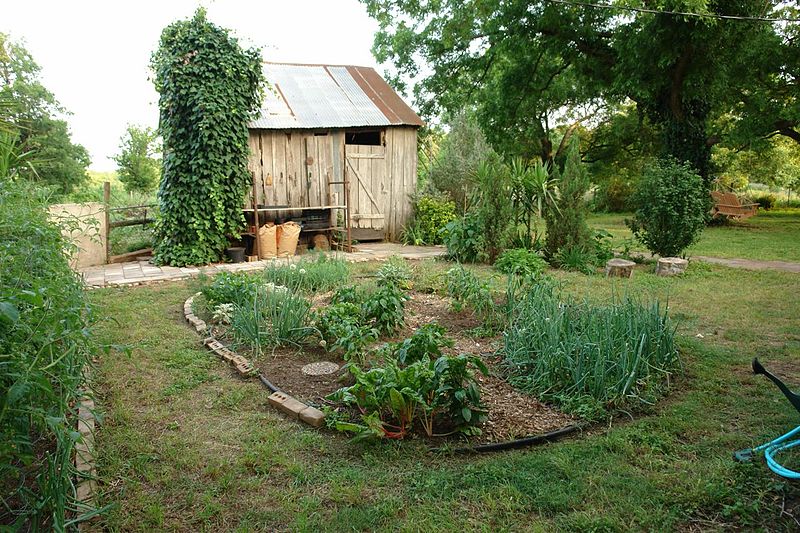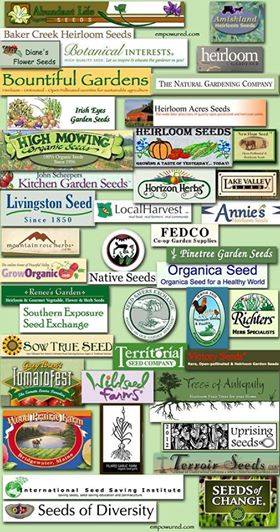Table of Contents[Hide][Show]

Seed catalogs for the upcoming growing season are arriving in mailboxes across the Northern Hemisphere with home growers everywhere starting to plan which seeds they will sow in freshly composted garden. A positive trend in recent years is the growing number of gardening enthusiasts choosing to plant gardens using organic and/or heirloom seeds.
What most of these home gardeners don’t realize is that corporate behemoth and GMO titan Monsanto has been gobbling up the seed market faster than a caterpillar can munch a tomato plant! With one fell swoop in 2005, Monsanto grabbed approximately 40% of the US vegetable seed market with its acquisition of Seminis.
This means that a home gardener could unknowingly be supporting the development and proliferation of genetically modified crops if the seeds used are from Seminis. In addition, Monsanto now apparently owns the trademark for many of the names of the heirloom seed varieties themselves!
Planting a sustainable home garden is much more than just choosing certified organic seeds and seedlings, eschewing pesticides/herbicides and using organic compost. This is because Monsanto has cleverly positioned itself to make money off the home gardening trend.
Does this mean that even if you buy organic or heirloom seeds from a completely independent company some of your purchase might be supporting the bad guys?
Yes, it does.
Surprise!
Home gardeners would do well to bone up on where to purchase their seeds so they aren’t inadvertently doing business with companies that maintain a working relationship with Monsanto-Seminis or were acquired by them.
Buying Organic or Heirloom Seeds Without Supporting Monsanto
Here are the recommended steps for the 2014 growing season for those who want to truly strike a blow for sustainability in every way with their home gardens:

Avoid buying from the seed companies affiliated with Monsanto. Here’s a list of these seed companies by location (enter you zipcode for a list of dealers to avoid).
- Buy from companies Monsanto HASN’T bought and are not affiliated or do business with Seminis: The graphic above indicates numerous companies that are worthy of your patronage as compiled by the International Seed Saving Institute. Please note that this many not be a complete list. If your seed company does not appear, just be sure to clarify with the owner about any potential affiliation with Monsanto-Seminis before buying from them.
- Avoid buying heirloom varieties for which Monsanto owns the trademark.
- Ask seed companies if they have taken the Safe Seed Pledge. Here’s a list of companies that have taken the Safe Seed Pledge and believe in responsible plant genetics. These are good companies to buy from.
Background on Monsanto’s Quest for World Seed Domination
Monsanto’s corporate quest is clearly to make money on each and every one of us whether we choose to eat supermarket frankenfoods produced with abominable, patented GM crops or carefully plant and tend an organic garden at home. Here’s some background information on the subject you may find interesting as well as enlightening:
If you are a home gardener and have information to contribute regarding these steps, please add to the discussion in the comments section. Also, please spread the word via gardening forums you may participate in that folks need to be very careful when seed sourcing for their spring gardens this year else they might be unknowingly supporting Monsanto.
Let’s make this the year when Monsanto’s grip on the worldwide seed market loosens and the movement to seed sustainability gains momentum!
Update
The day after this article was originally published in 2013, the CEO of a large GMO soybean seed company in the Midwest emailed me complaining that the article was short-sighted and insisting that Monsanto is helping feed the starving people of the world. He even went so far as to say that GMO crops are “proven safe”. Click here for the text of this CEO’s entire email plus my written reply.
I have also received email complaints from two other seed companies, one in Canada and one in Arkansas, that do business with Monsanto-Seminis and were offended by what they viewed as inaccuracies in the post. In response, I have adjusted the text slightly and moved linked sources to within the text rather than only listed at the end to make the message of the post as clear and precise as possible so as to not result in any consumer confusion over the information.
I have received no complaints about this article from seed companies completely independent of any affiliation or ties to Monsanto-Seminis.
More Information
Why I Avoid Organic Hydroponic Produce
The Hydroponic Invasion of USDA Organic
Heirloom vs Hybrid Produce
Photography Credit








Thanks for sharing!
It’s all so confusing. All I want is to have truly organic garden. Does anyone know where I can buy organic (non-gmo/GE) vegetable plants? I found one place on the list (the natural gardening company) but the shipping is astronomical in comparison to what I had been paying with my old companies! I don’t mind naturally crossed hybrids, just no genetic “fiddling”. Also, has there been a determination about Bonnie plants and any association to Monsanto??
Bonnie Plants carries Monsanto products.
I am finding this very confusing. Which seed companies belong to Monsanto and which do not?
Yeah, the graphic needs to be moved to point #2.
Also, am I safe to find a type of vegetable that a Safe Seed Pledge Company has on their website and buy it from my local farm supply store? Ex. Danver and imperator carrots are listed on a company’s website that’s taken the pledge. Does that mean all danver and imperator carrots are safe or just from that certain company?
Hi! I am totally new to gardening and want to start right. I just returned from my local farm supply store in my town and when I asked about organic/non-gmo seeds the man said, “oh you mean seeds that haven’t been tinkered with?” He took me over to a section and said that these seeds were antique and hadn’t been messed with. This sounded pretty good to me, but I was a little unsure. He gave me a small paper booklet of Wax Seed Company a local company 30 miles away. I’ve been going through it and comparing it to your list and the only time a Monsanto name pops up is under their list of hybrid seeds. I called Wax and the lady told me that other than hybrid seeds they don’t sell any seeds that have been genetically modified. So my question is can I trust that, and would these seeds be ok:
Danvers half long carrots
Cucumbers- Ashley, long green improved, space master
Romaine lettuce
Zucchini dark green or black beauty
Tomato- Rutgers, marglobe
Any help would be SO much appreciated
He also mentioned Bocto soil which he said was chemical free?
The less Monsanto the better.
i am 95% sure all the seeds I have germinated for this season is monsanto’s own now 🙁
James T Huckaba
Can anyone point me to a great tasting organic (non-GMO) Sweet corn seed? Seedsavers didn’t do it for us last year.
I found this site on here – lots of seed companies to go through, some offer one thing, others offer more.
http://www.cornucopiaseeds.com/seeds-veg.htm
They also have flowers and herbs, a few fruits
I’ve have great success with Clear Creek Seeds. Grew their Golden Bantam corn last well that did well.
It’s non-gmo, non-hybrid. Other places also carry it but they also had the peppers I was looking for.
Botanical Interests out of Colorado, they are on the non gmo committed list attached to this aritcle